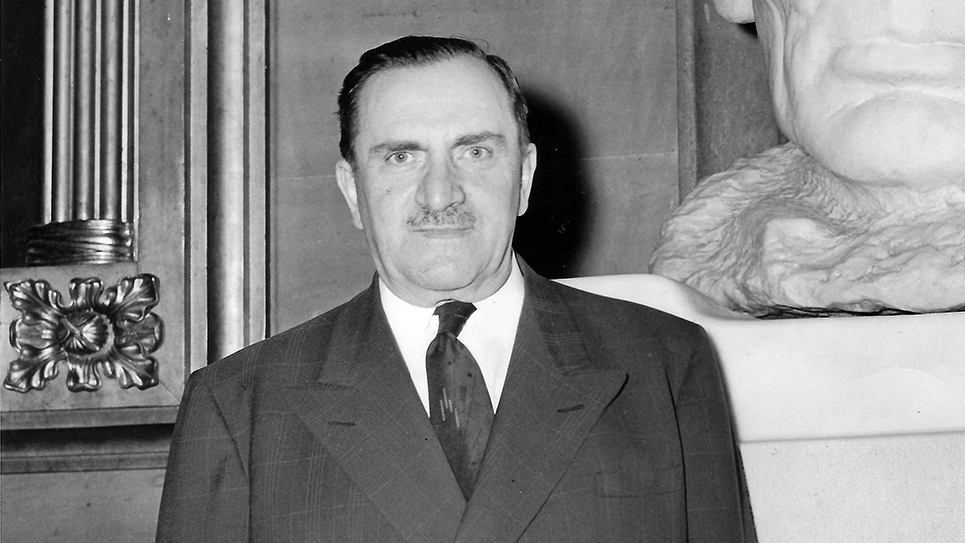‘The most difficult decision I’ve had to make in my life’
By Tom Mattingly
Sometimes, the best coaching search is no search at all.
Consider Dec. 4, 1976, a day all of Big Orange Country had breathlessly awaited. A Tennessee legend was coming home, nearly 20 years after he had played his last game in an orange and white uniform.
Chancellor Jack Reese’s remarks that day at Stokely Athletics Center were vintage, perhaps even brilliant: “After an extensive nationwide search, I am pleased to welcome Coach Majors here.” Those 13 words presaged a new era in Tennessee football.
“Coach Majors” was John Terrill Majors, a 1956 All-American and Heisman Trophy runner-up, two-time SEC “Player of the Year,” and the first of three Majors brothers to play at Tennessee. This coaching search really wasn’t one, not even close, but for Vol fans, it didn’t matter. He was overwhelmingly the “people’s choice.”
For his part, Majors had actually experienced this drill before. In 1954, after a 26-0 loss at Vanderbilt, Bob Neyland had dismissed his successor, Harvey Robinson, 10-10-1 in his two seasons. He called it the “hardest thing I’ve ever had to do.”
Majors was on campus in those days in late 1954 and early 1955, having finished his sophomore season, when another Tennessee legend came home to jubilant fans and the thought Tennessee was “back,” right where they should be, among the elite of college football. There was no one else Vol fans wanted this time, either.
Bowden Wyatt, the Kingston native with the movie star good looks, was the “people’s choice” of that earlier era. He was captain of the 11-0 1938 team and one of the most popular players of his or any other time. He came on board Jan. 8, 1955, saying, “I’m going back to the job I’ve always wanted.”
No one knows what George Cafego might have said if Wyatt had gone to Vandy, but it wouldn’t have been pretty, given Cafego’s pronounced distaste for the Commodores. After leaving Tennessee in 1962, Wyatt coached for a couple of years at Oklahoma State, a move facilitated by Bear Bryant.
The coaching search in 1963, after Jim McDonald was let go, was intriguing. Numerous names were mentioned — Murray Warmath (Minnesota), Paul Davis (Mississippi State), Jim Owens (Washington), and Clay Stapleton (Iowa State). Warmath and Stapleton were former Vols, Davis was from Knoxville, and Owens had no apparent Tennessee connections.
Bob Woodruff wanted Arkansas assistant coach Doug Dickey, his quarterback at Florida, who had been barely mentioned as a contender by media types. Tabbing Dickey as steward of the Vol program was a surprise to most observers. Afterwards, athletics board members Breezy Wynn and Jerome Taylor resigned, and there was a compromise that made McDonald an assistant athletic director.
“I knew a long time ago that I was going to lose Dickey to Tennessee,” said Arkansas head coach Frank Broyles. “Every time I saw Woodruff, he would ask me about Doug’s progress.”
In early 1970, there was another “search” after Dickey took the Florida job. Woodruff let it be known that assistants Doug Knotts, Jimmy Dunn, and Bill Battle were in the running, with Battle considered the “sleeper.”
There were those, including trustee Col. Tom Elam and president Andy Holt, who wanted Majors, then in his second year at Iowa State. Elam, a firm believer in the chain of command, did reluctantly convince Holt to support Woodruff’s decision. Holt had told Elam that, “your vote is my vote,” but relented when Elam cited the organizational pitfalls of overriding their athletic director on such an important issue.
Thus, Battle got the job.
As Battle’s star faded in the mid-1970s, the public outcry was for Majors, who had the Pittsburgh program in full gear, headed toward a national championship in 1976. It was also a time history began coming full circle.
When his alma mater beckoned, Majors accepted, not without significant thought.
“It was one of the most difficult decisions I ever had to make,” Majors recalled. “It took me three or four days to reach the decision. Looked at from a practical point of view, it didn’t make much sense for me to leave Pittsburgh.”
At that point in time, Tennessee and Majors were a match made in heaven. There was talk about selling out the Orange and White game. Excitement engulfed the community. When the Vols ran through the “T” before the California game, Neyland Stadium had never been louder.
When Jimmy Streater broke the line of scrimmage early in the game and ended up with an 80-yard touchdown run, the noise level increased. Analyst Bill Anderson’s voice could he heard over John Ward’s play-by-play on the Vol Network urging Streater on.
Majors led Tennessee to three SEC titles and 12 bowl appearances during his time on the west side of Shields-Watkins Field.
A final word.
Sometimes these “searches” are what they are advertised to be, sometimes not. No one remembers what was said at the other media conferences, but Jack Reese, an able and affable administrator, set a memorable standard for all who would follow.
The peasants would have literally stormed the castle had any name other than John Majors been uttered on that early December day in 1976.






